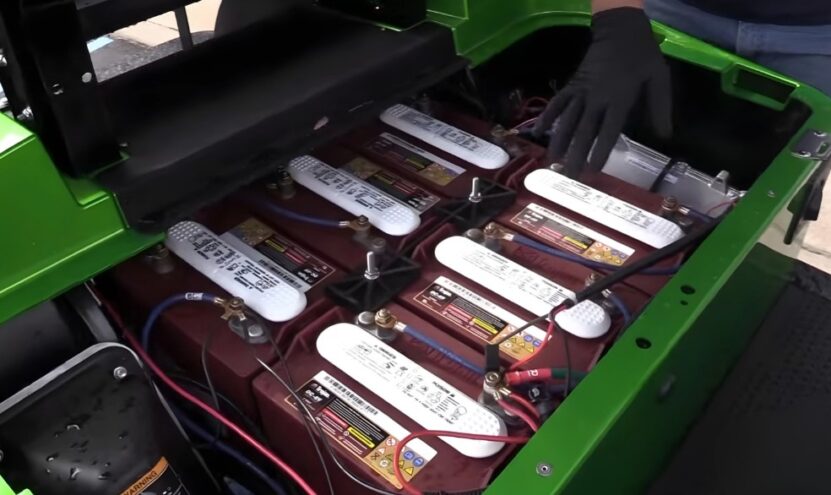Let’s talk about golf carts – specifically, their weight. Understanding the weight of a golf cart is more important than you might think, as it affects everything from performance to maintenance.
In this article, we’ll break down the average weights of different types of golf carts, examine the factors influencing these weights, and discuss why knowing this information matters for anyone using or considering a golf cart.
Key Takeaways
- The weight of a golf cart typically ranges between 900 to 1,100 pounds (410 to 500 kg).
- Its weight can be affected by several factors, including the size and type of the battery (lead-acid vs lithium-ion), the materials used in the cart’s construction (such as aluminum or steel), the inclusion of accessories and customizations, and the cart’s passenger capacity.
- The weight of a golf cart affects its speed, power, and terrain handling. It also influences how the cart handles different terrains and affects battery life in electric models and fuel consumption in gas-powered ones.
- The weight of a golf cart is crucial for safe transportation and storage. It determines the type of trailer or vehicle needed for transportation and might require reinforced flooring or special equipment for storage, particularly for heavier models.
Average Weights

The average weight of a golf cart varies between 900 to 1,100 pounds (410 to 500 kg). Electric golf carts generally weigh around 1,000 pounds (450 kg). Gas-powered carts, on the other hand, tend to weigh around 600 to 700 pounds (270 to 320 kg).
These weights can be further influenced by the cart’s make, model, and any customizations or additional features. For example, luxury carts with high-end materials and extra amenities can weigh more than the average.
Types of Golf Carts
Golf carts come in various styles and sizes, each affecting the overall weight. The two main types are electric and gas-powered carts. Electric carts tend to be heavier due to their batteries, while gas-powered carts are lighter but add weight with fuel.
The choice between electric and gas-powered carts often depends on personal preference, usage, and the course environment. Hybrid models, combining features of both types, are also emerging, offering a middle-ground in terms of weight.
Furthermore, specialized carts designed for specific purposes, such as maintenance or larger passenger capacity, also vary significantly in weight.
Why Weight Matters

Weight plays a vital role in the performance and efficiency of a golf cart. It affects the cart’s speed, battery life, and overall handling. Knowing the weight can also be essential for transportation and storage purposes.
Heavier carts might struggle on uphill courses, while lighter carts may be more susceptible to being unstable on uneven terrain. Additionally, the weight of the golf cart can influence the type of trailer or vehicle needed for transportation.
For storage, heavier carts may require reinforced flooring or special equipment to lift and move them safely.
Which Factors Influence the Weight?

Several factors influence the weight of a golf cart:
| Factor | Description | Impact on Weight |
|---|---|---|
| Battery Size |
|
Increases with larger and more batteries; lithium-ion batteries are lighter |
| Materials |
|
Aluminum decreases weight; steel increases weight |
| Accessories |
|
Additional features and customizations increase weight |
| Passenger Capacity |
|
Heavier with increased passenger capacity and necessary reinforcements |
The Impact of Weight on Performance

Speed and Power
Heavier golf carts might have reduced speed and take longer to reach maximum power. This is particularly noticeable in electric models where battery weight plays a significant role. The added weight can also strain the motor, leading to increased energy consumption and reduced efficiency.
Terrain Handling
Weight affects how a golf cart handles different terrains. Lighter carts are more suited for flat surfaces, while heavier carts can handle uneven terrains better. A heavier cart also offers more stability in windy conditions but may require more power to navigate hilly terrains.
Battery Life and Fuel Consumption
In electric golf carts, heavier weight can drain batteries faster, reducing the distance the cart can travel. For gas-powered carts, more weight means increased fuel consumption. Additionally, the efficiency of the drive system can be impacted, requiring more frequent charging or fueling stops.
Transportation and Storage Considerations

Knowing the weight of your golf cart is essential for safe towing. Ensure your trailer can handle the cart’s weight, especially when considering additional gear. It’s also important to consider the towing capacity of your vehicle to ensure safe transportation.
Weight considerations are also crucial when storing your golf cart. Heavier carts might require more robust storage solutions to support the additional weight. In some cases, reinforced flooring or specialized storage systems may be necessary to accommodate the heavier models.
How to Maintain These Carts?

Heavier golf carts put more strain on tires and brakes, potentially leading to faster wear and tear. Regular inspections and maintenance are crucial to ensure safety and optimal performance. Upgrading to higher-quality tires and brakes can also be a wise investment for heavier carts.
Battery Maintenance
For electric golf carts, maintaining battery health is crucial. Heavier weights can strain batteries, necessitating more frequent checks and replacements. It’s essential to follow proper charging procedures and store batteries appropriately to prolong their life.
FAQs
Can the type of terrain affect the choice between an electric and gas-powered golf cart?
Definitely. Electric carts are generally better for flat, smooth terrains due to their weight and battery life considerations. Gas-powered carts, being lighter, can handle more varied terrains and are better suited for courses with hills or rough terrain.
How does weather impact the performance of different types of golf carts?
Electric carts may perform less efficiently in very cold temperatures as battery capacity can decrease. Gas-powered carts are less affected by temperature but may have issues in extremely humid conditions. Both types require more maintenance in areas with heavy rainfall or snow.
Is there a significant difference in the lifespan of electric vs. gas-powered golf carts?
The lifespan of a golf cart can vary depending on its type. Generally, electric carts have fewer moving parts and may require less maintenance, potentially leading to a longer lifespan. However, battery replacements can be costly. Gas-powered carts have engines similar to automobiles and may require more frequent mechanical maintenance.
How often should golf carts be serviced to maintain optimal performance?
It should be serviced at least once a year, but more frequently if used regularly or under harsh conditions. Regular maintenance should include checking the battery and charging system for electric carts, engine checks for gas-powered carts, tire inspection, and brake system maintenance.
Can golf carts be legally driven on public roads?
This varies by location. Some regions allow golf carts on roads with speed limits up to 35 mph, but they often require the cart to be equipped with certain safety features like seatbelts, lights, and mirrors. It’s important to check local regulations for specific requirements.
The Bottom Line
To wrap it up, the weight of a golf cart is a key factor that influences its performance, efficiency, and maintenance requirements. Knowing whether you have an electric or gas-powered cart, and understanding the impact of its weight, can guide you in making better decisions about its use and upkeep.
This knowledge is not just for the golf course but also crucial for safe transportation and storage. Keep these points in mind to ensure you get the most out of your golf cart, both in terms of longevity and performance.

